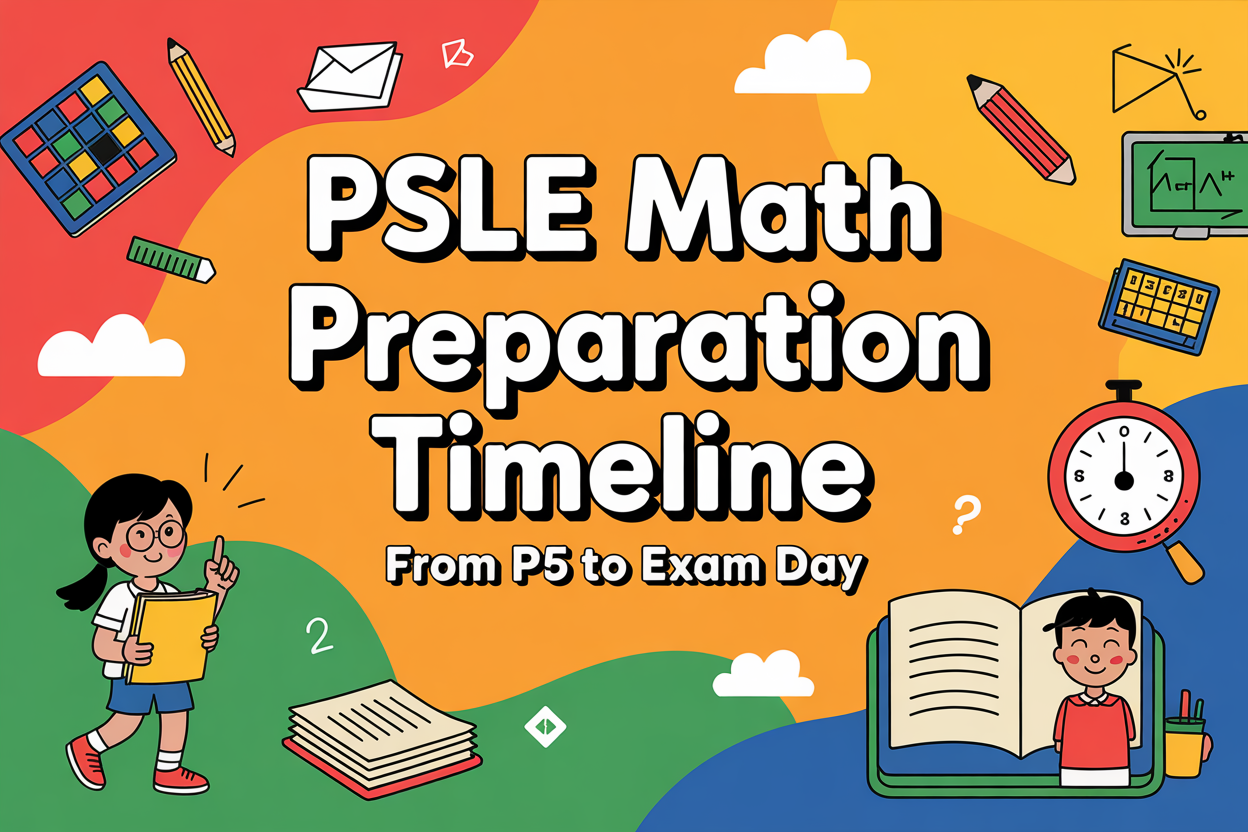- Apr 30, 2025
PSLE Math Preparation Timeline: From Primary 5 to Exam Day

- Understanding the PSLE Math Examination
- Primary 5 (First Half): Building the Foundation
- Primary 5 (Second Half): Expanding Competency
- Primary 6 (First Half): Intensive Preparation
- Primary 6 (Second Half): Final Preparations
- One Month Before PSLE: The Final Sprint
- Exam Week Strategies
- Common Challenges and How to Overcome Them
- How EduFirst Can Support Your Child’s PSLE Math Journey
The PSLE Mathematics examination represents a critical milestone in your child’s educational journey. As one of the four core subjects, Math plays a decisive role in determining secondary school options and future academic paths. With proper preparation, strategic planning, and consistent effort, students can approach this challenge with confidence and achieve their best possible results.
Many parents and students make the mistake of leaving PSLE Math preparation until the final months, resulting in unnecessary stress and potentially underperformance. Research shows that systematic preparation spread over an extended period yields better results and deeper understanding.
This comprehensive guide offers a structured PSLE Math preparation timeline spanning from Primary 5 to exam day. Following this roadmap will help eliminate last-minute cramming, reduce anxiety, and systematically build both skills and confidence for optimal performance when it matters most.
Understanding the PSLE Math Examination
Before diving into preparation strategies, it’s essential to understand what your child will face. The PSLE Math paper consists of two booklets:
Booklet A: 20 multiple-choice questions worth 2 marks each (40 marks total)
Booklet B: 15 short-answer and long-answer questions of varying difficulty (60 marks total)
The examination tests concepts from the entire primary school Mathematics syllabus, with particular emphasis on topics taught in Primary 5 and 6. These include:
– Whole Numbers, Fractions, and Decimals
– Percentage, Ratio, and Rate
– Geometry and Measurement
– Area and Volume
– Statistics and Data Analysis
– Problem-solving involving multiple concepts
Most students find challenging word problems, especially those involving fractions, ratio, and percentage, to be the most difficult. These questions often require multiple steps and the application of heuristics (problem-solving strategies).
Primary 5 (First Half): Building the Foundation
The journey toward PSLE Math success should begin in the first half of Primary 5. This period is crucial for establishing a solid foundation.
Assessment of Current Math Proficiency
Begin with a thorough assessment of your child’s mathematical strengths and weaknesses. Review their Primary 4 final exam results, noting areas where they excelled and struggled. This baseline understanding will help you tailor a focused preparation strategy.
Mastering Fundamental Concepts
During this period, ensure your child has mastered all fundamental concepts from Primary 3 and 4. These include basic operations with whole numbers, understanding of fractions and decimals, basic geometry concepts, and simple problem-solving techniques.
If gaps exist in these foundational areas, address them immediately. Without these basics firmly in place, more advanced concepts will prove challenging. At EduFirst, our teachers can quickly identify these gaps through our initial assessment and develop targeted strategies to strengthen these areas.
Establishing Consistent Study Habits
Consistency trumps intensity when it comes to math preparation. Work with your child to establish a regular study routine of 20-30 minutes of focused math practice daily. This might include reviewing school lessons, completing assigned homework thoroughly, practicing additional questions for reinforcement, and using math learning apps or online resources.
Target Areas for First Half of P5
Focus on these key areas during this period:
1. Mastery of the four operations with fractions and decimals
2. Understanding of percentage and its applications
3. Basic concepts of ratio
4. Area and perimeter of basic shapes
5. Building problem-solving skills through regular practice
Primary 5 (Second Half): Expanding Competency
As your child progresses through Primary 5, the curriculum introduces more complex concepts. This period should focus on expanding mathematical competency.
Introduction to More Complex Problem-Solving
By mid-Primary 5, students should begin tackling more complex multi-step problems. Introduce your child to various heuristic methods such as drawing models (bar models), working backwards, guess and check, making lists or tables, and looking for patterns.
Understanding when and how to apply these methods is crucial for success in challenging PSLE questions. Our small class sizes at EduFirst allow teachers to guide students through these techniques with personalized attention.
Addressing Weak Areas
By this point, your child’s strengths and weaknesses should be becoming clearer. Develop a targeted approach to address any challenging areas. Additional practice, seeking clarification from teachers, or considering supplementary help can make a significant difference.
Holiday Revision Strategies
The end-of-year holidays provide an excellent opportunity for consolidation and advancement. Create a balanced holiday revision plan that includes a comprehensive review of Primary 5 topics covered, pre-learning of upcoming Primary 6 concepts, practice with more challenging questions, and timed practice to build speed.
Balance study with adequate rest and enjoyable activities to maintain motivation and prevent burnout. Many parents find that holiday programs, like those offered by EduFirst, provide structured learning while maintaining the holiday spirit.
Progress Tracking and Adjustment
Regularly assess your child’s progress using practice tests or assessments. Track improvement in previously weak areas and adjust the study plan accordingly. Celebrate improvements to maintain motivation and confidence.
Primary 6 (First Half): Intensive Preparation
The first half of Primary 6 marks the transition to more intensive PSLE preparation. The focus shifts to comprehensive coverage and building exam skills.
Comprehensive Revision of All Topics
Create a systematic schedule to review all Primary 5 topics while learning new Primary 6 concepts. Ensure your child is actively connecting related concepts rather than viewing topics in isolation. Mathematical concepts build upon each other, and understanding these connections improves problem-solving ability.
Practice with Past Year Papers
Introduce your child to past year PSLE papers and preliminary examination papers from various schools. Start with untimed practice to build confidence, then gradually introduce time constraints. After each practice session, thoroughly analyze mistakes and misunderstandings.
When reviewing incorrect answers, focus on understanding the underlying concepts rather than simply memorizing solutions. This approach builds deeper mathematical understanding that can be applied to unfamiliar problems in the actual examination.
Time Management Strategies
Teach your child effective time management for the PSLE Math paper. They should allocate approximately 1 minute per mark, complete familiar questions first, know when to move on from difficult questions and return later, and leave 5-10 minutes for review.
Practice these strategies regularly during mock tests to make them second nature. Time management is often the difference between a good and excellent performance in the PSLE Math examination.
Building Speed and Accuracy
Speed without accuracy is counterproductive. Help your child strike the right balance by practicing mental calculation regularly, learning to verify answers through estimation, checking work methodically, and developing the habit of careful reading of questions.
Primary 6 (Second Half): Final Preparations
The months leading up to the PSLE require a strategic approach focused on refinement rather than introducing new content.
Targeted Revision of Challenging Topics
By this stage, your child should have a clear understanding of their challenging areas. Create a targeted revision plan that allocates more time to difficult topics while maintaining familiarity with stronger areas. Focus particularly on high-weightage topics like problem-solving with fractions, ratio, and percentage; area and volume; speed and measurement; and complex word problems requiring multiple steps.
Mock Examinations and Simulations
Regular mock examinations under exam conditions help build stamina and reduce anxiety. Simulate the full PSLE experience by using the full time allocation, completing both booklets in sequence, maintaining exam-like silence and focus, and practicing with unfamiliar questions.
After each simulation, conduct a thorough review to identify and address any persistent issues. This practice helps students become comfortable with the examination format and reduces anxiety on the actual day.
Managing Exam Anxiety
Many students understand the concepts but underperform due to anxiety. Help your child develop coping strategies such as deep breathing techniques, positive self-talk, visualization of success, regular physical exercise, and adequate sleep.
Remember that managing the psychological aspects of exam preparation is just as important as the academic components. At EduFirst, our experienced teachers provide not just academic support but also strategies to manage exam stress.
Fine-tuning Problem-Solving Techniques
Help your child refine their approach to problem-solving by reading questions multiple times before attempting, identifying key information and requirements, selecting appropriate methods or heuristics, presenting solutions clearly and step-by-step, and verifying answers for reasonableness.
One Month Before PSLE: The Final Sprint
The final month before PSLE requires careful planning to maximize readiness without inducing burnout.
Creating a Final Revision Schedule
Develop a structured revision schedule that covers all topics while emphasizing challenging areas. Include regular breaks and ensure adequate rest. The schedule should be realistic and account for school commitments as well as your child’s energy levels and concentration span.
Focusing on High-Yield Topics
Some topics appear more frequently and carry more weight in the PSLE. These typically include ratio, rate, and proportion problems; fractions and percentage; area and volume; problem-solving involving algebra; and data analysis and statistics.
While not neglecting other areas, ensure these high-yield topics receive adequate attention during final revision. Many of these topics are interconnected, so strengthening one often improves performance in others.
Practice Strategies for Maximum Retention
Use spaced repetition and mixed practice to enhance long-term retention. This includes revisiting topics at increasing intervals, mixing different types of problems rather than practicing one topic exclusively, focusing on understanding rather than memorization, and using different resources to see various question types.
Mental Preparation Techniques
Prepare your child mentally for the examination by normalizing the idea that some questions will be challenging, developing strategies for managing difficult questions, building confidence through consistent practice success, and maintaining a positive but realistic outlook.
Exam Week Strategies
The final week requires a different approach focused on maintaining knowledge rather than intensive learning.
Last-Minute Revision Dos and Don’ts
DO:
– Review key concepts and formulas
– Practice a few questions daily to stay sharp
– Revise challenging topics briefly
– Review commonly made mistakes
DON’T:
– Attempt new types of questions
– Stay up late studying
– Cram intensively
– Take full practice papers
Physical and Mental Preparation
Physical wellbeing directly impacts cognitive performance. Ensure regular, nutritious meals, maintain consistent sleep schedules, incorporate light physical activity, limit screen time, and practice relaxation techniques during the final week.
Day-Before Preparation
The day before the exam should focus on confidence-building. Organize all necessary materials (2B pencils, ruler, eraser), review key formulas briefly, go to bed early, prepare exam attire, plan the morning routine, and avoid intensive studying.
Morning of Exam Routine
Start the day positively by waking up with adequate time to prepare calmly, eating a balanced breakfast, arriving at the examination venue early, using positive affirmations, and doing light stretching or deep breathing to remain calm.
Common Challenges and How to Overcome Them
Throughout the preparation journey, various challenges may arise. Here’s how to address them:
Dealing with Math Anxiety
Math anxiety can significantly impact performance. Combat it by breaking down complex problems into smaller steps, celebrating small successes, creating a positive association with math through games, focusing on understanding rather than memorization, and seeking help early when concepts aren’t clear.
Overcoming Plateaus in Progress
Progress isn’t always linear. When facing plateaus, change the approach or resources, take a short break from that specific topic, revisit prerequisites that might need strengthening, seek alternative explanations or methods, and consider additional support like EduFirst’s specialized PSLE Math preparation programs.
Maintaining Motivation Through the Preparation Journey
Sustained motivation is crucial for long-term preparation. Set specific, achievable goals, track and celebrate progress, connect math to real-world applications, use varied resources to maintain interest, and balance work with adequate rest and enjoyable activities.
Adapting to Different Learning Styles
Each child learns differently. Identify your child’s learning style and adapt accordingly. Visual learners benefit from diagrams, charts, and model drawings; auditory learners may prefer verbal explanations and discussions; and kinesthetic learners often learn best through manipulatives and hands-on activities.
At EduFirst Learning Centre, our small class sizes of 4-8 students allow our teachers to adapt their teaching methods to accommodate different learning styles.
How EduFirst Can Support Your Child’s PSLE Math Journey
At EduFirst Learning Centre, we understand the challenges of PSLE Math preparation and offer specialized support to complement your home preparation efforts.
Our Approach to PSLE Math Preparation
Our PSLE Math programs are designed by experienced educators who understand the examination requirements and common student challenges. We offer structured curriculum that aligns with the PSLE syllabus, regular assessments to track progress, targeted intervention for challenging topics, development of effective problem-solving strategies, and time management and exam skills training.
Benefits of Our Small Class Environment
With class sizes limited to 4-8 students, we provide personalized attention to each student’s needs, tailored guidance based on individual learning styles, opportunities for collaborative learning, safe environment to ask questions and clarify doubts, and regular feedback on progress and areas for improvement.
Success Stories and Outcomes
Our proven approach has helped numerous students achieve significant improvements in their math performance. Many enter our program struggling with specific concepts and leave with both confidence and competence to tackle the PSLE Math paper successfully.
Available Resources and Programs
EduFirst offers various resources to support PSLE Math preparation including regular PSLE Math classes, intensive revision programs, holiday workshops focusing on challenging topics, practice materials and assessments, and parent guidance sessions.
Preparing for the PSLE Mathematics examination is a marathon, not a sprint. By following this structured timeline from Primary 5 through to exam day, you can help your child build knowledge, skills, and confidence systematically.
Remember that effective preparation involves balance – between focused practice and adequate rest, between addressing weaknesses and building on strengths, between academic preparation and emotional support. The goal is not just a good grade but developing a solid mathematical foundation and positive learning habits that will serve your child well beyond the PSLE.
With proper planning, consistent effort, and the right support system (whether at home or through programs like those offered at EduFirst Learning Centre), your child can approach the PSLE Math examination with confidence and achieve their full potential.
Want to give your child the advantage of personalized PSLE Math preparation? EduFirst Learning Centre’s small-group tuition provides the perfect balance of individual attention and collaborative learning. Our experienced teachers specialize in breaking down complex concepts and building confidence through systematic practice.




